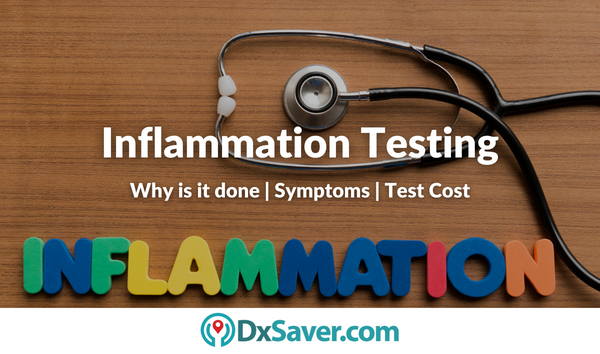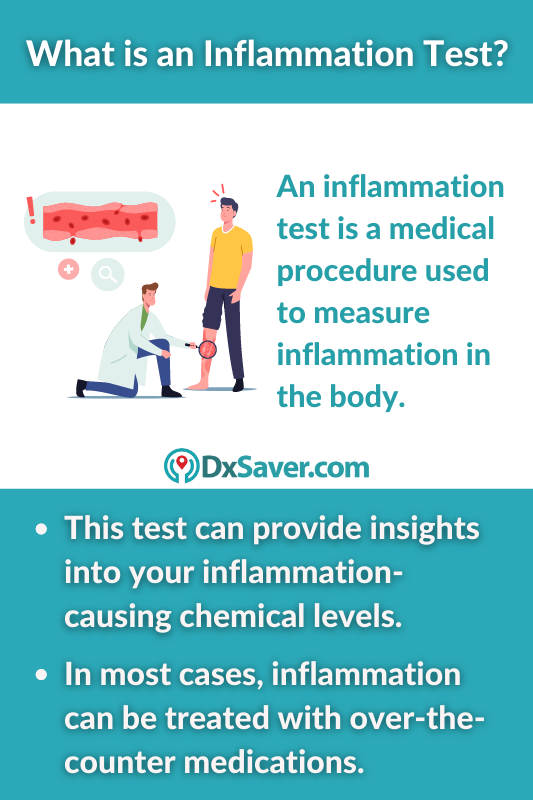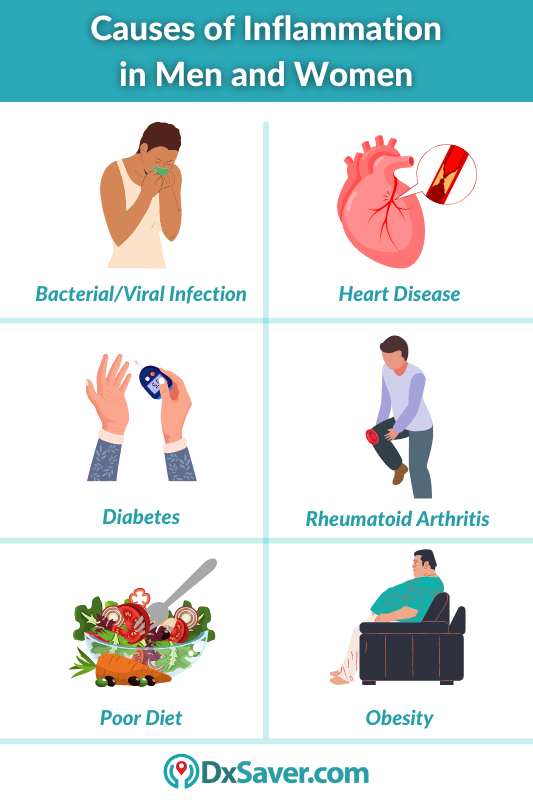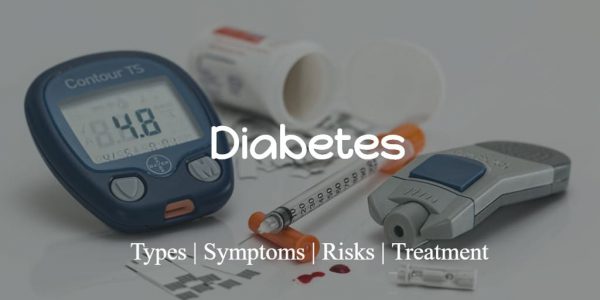
An inflammation test is a blood test that measures the levels of certain markers like C-reactive protein (CRP) in the blood that indicate inflammation in the body. High levels of these markers can indicate an inflammatory response in the body, which can be caused by a variety of conditions such as bloating, asthma, allergies, and high blood sugar.
The inflammation test results provide an indication of the level of inflammation in the body and can help diagnose and monitor certain medical conditions.
- What is inflammation?
- Symptoms of inflammation in men and women,
- Causes of inflammation
- How to test for inflammation?
- What is an inflammation blood test?
- When to consider an inflammation blood test?
- Is there any risk associated with an inflammation blood test?
- How to prepare for the inflammation blood test?
- Treatment for inflammation
- How to avoid inflammation?
- Providers location
For our readers, who are more interested in knowing the inflammation test cost beforehand, we begin with that section.
How much does the inflammation test cost?
An inflammation test costs $99 in the U.S. The cost of an inflammation test also depends on your choice of visiting the nearest lab or getting tested at home using the inflammation home test kit. Complete the procedure and get the results in your email in 2 to 5 business days. Doctor consultation is also available for further treatment or any kind of medical advice.
The following table shows the inflammation home test kit cost by one of our partners located in the U.S.
Name of our Partner Labs | Book Online |
myLabBox(Home Test Kit)
| Offer Price$99 |
What is inflammation?
Inflammation is a response from the body to protect itself from inflammation-causing agents, such as bacteria or viruses. It can also be caused by injuries, allergies, and autoimmune diseases. Inflammation is considered to be a natural process that helps the body fight off illnesses, but when inflammation occurs in the wrong places or goes on for too long it can cause serious issues.

Symptoms of inflammation in men and women
Common signs of inflammation in both men and women include swelling, redness, and warmth in an area of the body usually accompanied by pain or discomfort. In some cases, inflammation can manifest itself through digestive problems such as abdominal pain and diarrhea as well as fatigue and joint stiffness.
Inflammation can cause a wide range of symptoms and signs, and these can vary depending on the specific cause and location of the inflammation. Some common symptoms and signs of inflammation in both men and women include:
- Pain: Inflammation can cause pain in the affected area, which can be dull, sharp, or burning.
- Swelling: Inflammation can cause swelling and tenderness in the affected area.
- Redness: The affected area may appear red due to increased blood flow to the area.
- Heat: The affected area may feel warm to the touch due to increased blood flow and inflammation.
- Loss of function: Inflammation can cause stiffness, weakness, and loss of function in the affected area.
Symptoms and signs that are specific to men or women include:
- Men: Prostatitis can cause pain or discomfort in the lower back, pelvis, or genital area, as well as pain or discomfort during ejaculation or urination. Testicular inflammation can cause pain or discomfort in the testicles.
- Women: Endometriosis can cause pelvic pain, pain during intercourse, and heavy or irregular periods. Pelvic inflammatory disease (PID) can cause fever, abdominal pain, pain during intercourse, and irregular periods.
Causes of inflammation in men and women
Inflammation is a natural response of the body’s immune system to injury, infection, or other forms of damage. Many different conditions and diseases can cause inflammation, and the causes can vary between men and women.
Some common causes of inflammation in both men and women include:
- Infections, such as bacterial and viral infections
- Autoimmune disorders, such as rheumatoid arthritis and lupus
- Injuries, such as sprains, strains, and fractures
- Chronic conditions, such as diabetes and heart disease
- Exposure to toxins and pollutants
- Certain medications, such as NSAIDs and steroid hormones
- Obesity and poor diet
There are also some causes of inflammation that are specific to men or women:
Men: Prostatitis (inflammation of the prostate) and testicular inflammation can cause inflammation.
Women: Endometriosis (inflammation of the lining of the uterus) and pelvic inflammatory disease (PID) can cause inflammation.
If you suspect you have an inflammatory condition it is important to consult your physician for proper diagnosis and treatment. Your physician shall recommend taking an inflammation test to analyze what metrics have been inflated in your body and to prescribe medications accordingly to subsidize it.

How to test for inflammation?
When inflammation occurs due to infection then there are tests available to help determine if inflammation is present. The type of test undertaken varies according to the type of inflammation seen. A blood test can show inflammation levels in the body, while a stool sample may be needed to check for inflammation from bacteria or viruses. In some cases, like fractures, imaging tests such as MRI and X-ray can give more detailed pictures of which part of the bone is affected by inflammation.
What is an inflammation blood test?
An inflammation test is a medical procedure used to measure inflammation in the body. This test can be used to help diagnose diseases that cause inflammation in the body such as arthritis, heart disease, and cancer. Inflammation testing is important because it allows your physician to monitor inflammation levels over time and identify if there are any changes that may indicate an underlying condition or infection.
During inflammation testing, a sample of your blood or tissue from the affected area is taken in order to measure inflammation-causing chemicals being released by the body. The results of this test can provide insight into how much inflammation is present and what type of treatment might be necessary for managing inflammation-related symptoms.
Inflammation tests are usually administered through a simple blood or tissue sample. They are usually not painful or invasive, although some inflammation tests may require more extensive procedures such as biopsies.
When to consider an inflammation blood test?
Inflammation testing should be considered if you are experiencing inflammation-related symptoms such as pain, stiffness, warmth, redness, and swelling in the affected area. Inflammation testing can also be used to monitor inflammation levels over time in order to detect any changes that could indicate an underlying condition or infection.
Is there any risk associated with an inflammation blood test?
There is no risk associated with inflammation testing other than the risk of having needles inserted into the body during a procedure such as a biopsy. However, this type of risk can be minimized by working with experienced medical professionals who have the necessary training and expertise. With our partner, you can provide a sample of your blood with the finger prick tool provided in the at-home test kit – a much painless way compared to standard blood drawing in walk-in labs.
How to prepare for the inflammation blood test?
There is usually no special preparation required for an inflammation blood test. However, the following tips can be considered:
- Inform your doctor of any medications you are taking, as some can affect test results.
- Avoid taking nonsteroidal anti-inflammatory drugs (NSAIDs) such as ibuprofen, naproxen, and aspirin for at least 24 hours before the test as they can affect results. Again, it is highly recommended to consult with your physician about whether to stop these medications before taking the test.
- Avoid smoking and drinking alcohol for at least 24 hours before the test.
- Schedule the test at a time when you are not experiencing symptoms of an acute illness, such as an infection or injury, as these can also affect the results.
- There’s no restriction on diet. You can continue your regular food habit before the test.
Treatment for inflammation
The treatments for inflammation depend on the cause and severity of the inflammation. In many cases, inflammation can be treated with over-the-counter medications or antibiotics. However, if inflammation does not respond to these treatments then stronger prescription medications may be required.
Some lifestyle changes such as getting adequate rest, reducing stress levels, eating a balanced diet, and exercising regularly can also help reduce inflammation and prevent it from developing into chronic conditions.
How to avoid inflammation?
In order to avoid inflammation in the first place, individuals should focus on maintaining a healthy lifestyle. This includes eating a nutritious and well-balanced diet, exercising regularly, avoiding cigarettes and alcohol, and taking steps to reduce stress levels.
If inflammation is caused by an infection then it is essential to practice proper hygiene habits such as washing hands often and following recommended vaccinations. By following these tips you can help protect your body against inflammation-causing agents.
Providers location
An inflammation test can be done at any of your nearby labs or with our partner who sends in the at-home test kit to your doorstep. To know the cost of an inflammation at-home test kit, refer to the first section of the article.
FAQs
What is an inflammation blood test?
An inflammation blood test measures the levels of certain markers in the blood that indicate inflammation in the body. These markers include CRP and Vitamin D.
Why is an inflammation blood test done?
An inflammation blood test is done to help diagnose and monitor conditions such as rheumatoid arthritis, lupus, and inflammatory bowel disease. It can also be used to monitor treatment for these conditions.
How long does it take to get results from an inflammation blood test?
It typically takes a few days to get the results from an inflammation blood test. Our provider, myLabBox provides the results in 2 to 5 days and will discuss the results with you and explain what they mean.
Other topics you may be interested in:
- APOE gene test: Importance on brain health, symptoms, and test cost
- PCOS Testing: Symptoms, Causes, and Testing Cost
- What is Glyphosate Exposure: Symptoms, Testing Cost, and Prevention
- Cost of a PFAS Blood test in the U.S.
- Symptoms of mental disorders
- What MTHFR Gene mutations?
- What is gut health?
- A Comprehensive Guide on Skincare, Skin Problems, and Skin Health
- How much does the vaginitis test cost in the U.S.?
- Why do you need a mineral test?
- At-Home Chlamydia Testing in the US
- Order an at-Home Syphilis Test Kit
- STD Testing in NYC (New York City)
- Treatment for Inflammation in Men and Women
- Treatment for micronutrient deficiency
- Importance of essential vitamins
- Procedure for urinalysis testing
- Why do you need a heart health test?






